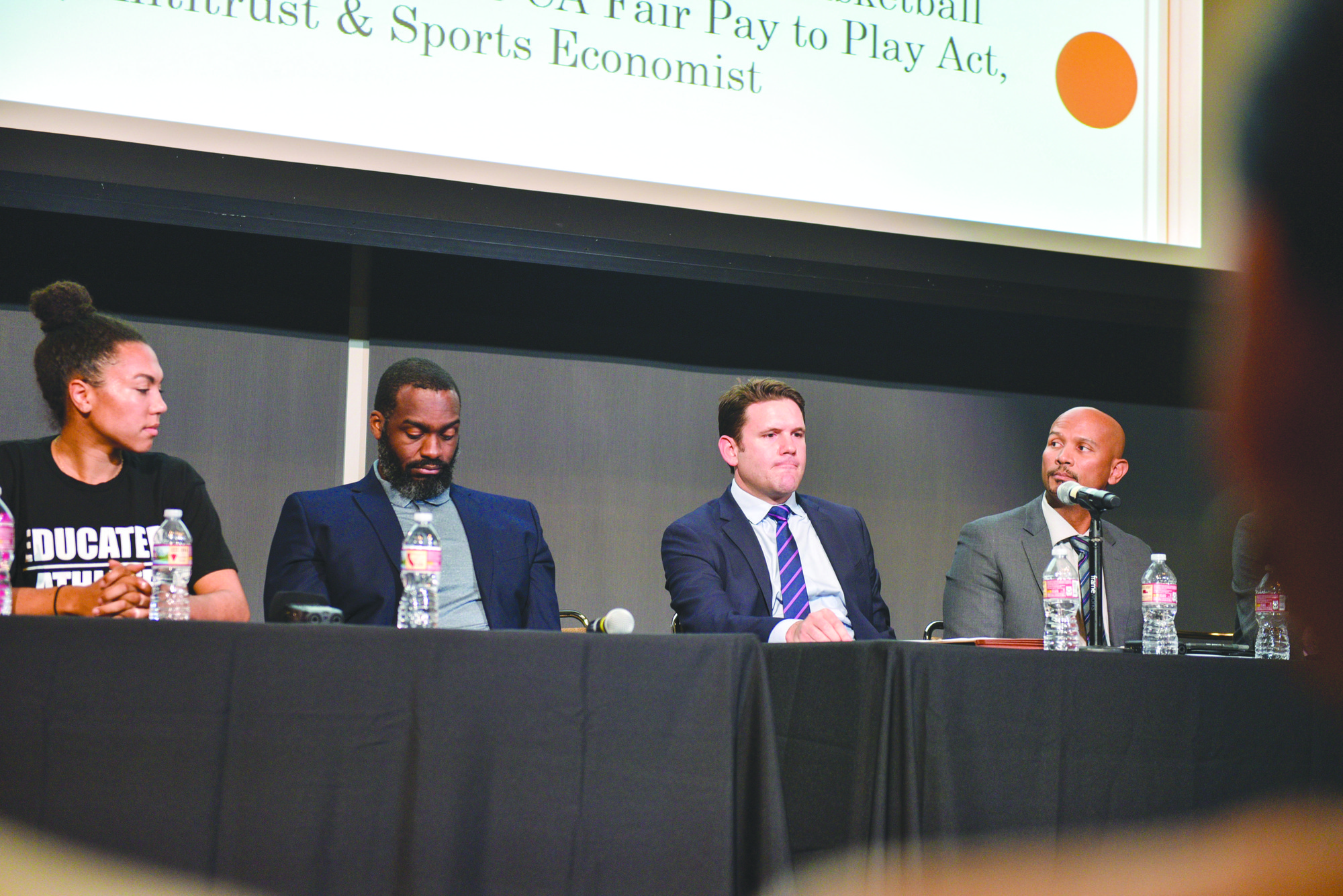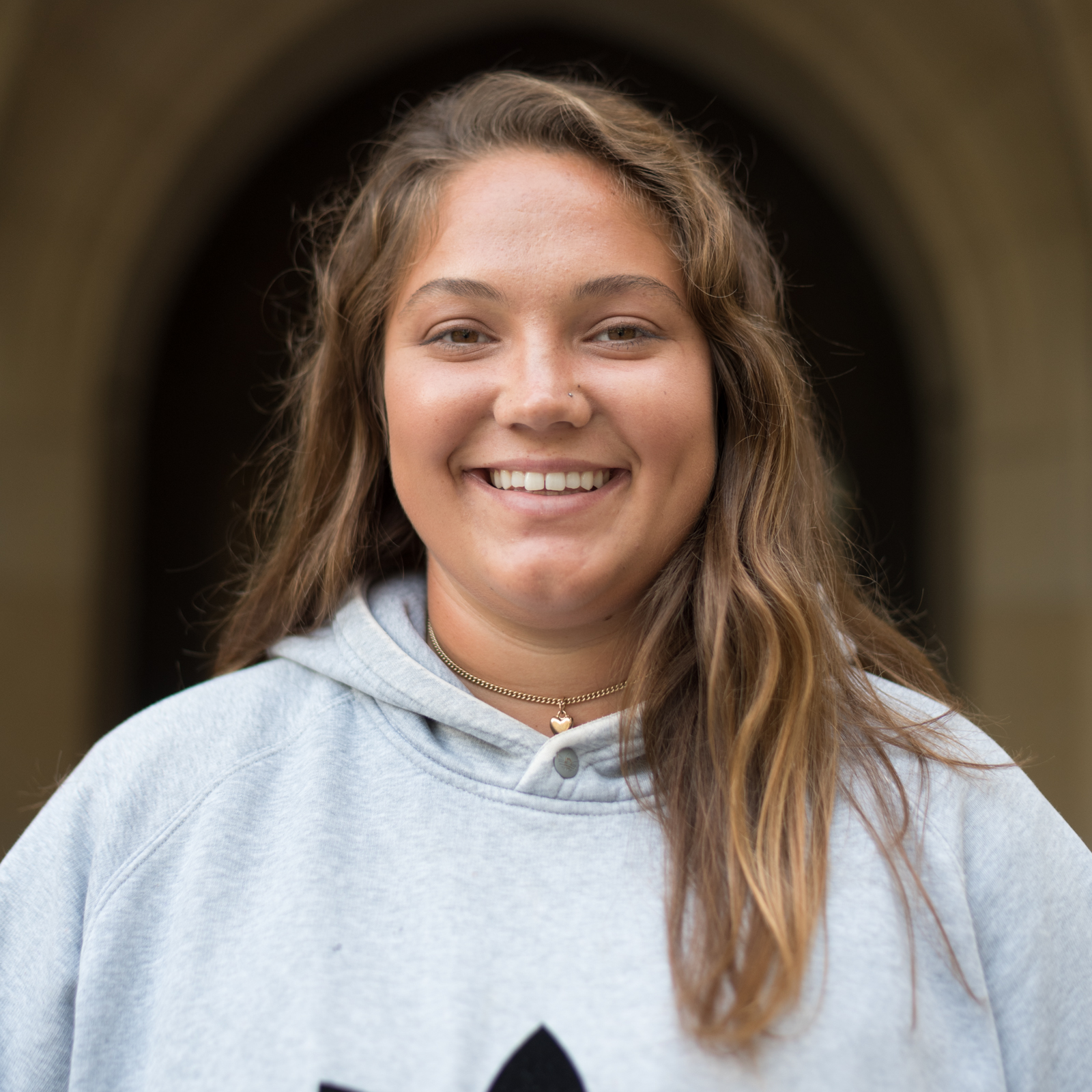Panel at UCLA covers student-athlete financial rights and off-the-field support

A panel of athletes, lawyers, administrators and economists spoke about the development of Senate Bill 206, the future of the NCAA as a result and the necessity of developing resources to promote student-athlete well-being. (Jacqueline Dzwonczyk/Daily Bruin senior staff)

By Jacqueline Dzwonczyk
Nov. 20, 2019 1:56 a.m.
Andy Schwarz – co-founder of the Historical Basketball League and co-sponsor of Senate Bill 206 – grabbed the microphone from former TCU football player and NFL Players Association staffer Joe Briggs.
“We’ve been hearing about a collegiate athlete dystopia,” Schwarz said. “I’d like to at least suggest to you that there could be a utopia.”
Schwarz and Briggs were two of 12 panel members who visited UCLA on Tuesday night to discuss “The Fate of College Athlete Pay and Health & Safety.” The group of current and former athletes, economists, and lawyers shared personal struggles ranging from student-athlete life to in-person meetings with the NCAA and University of California representatives while lobbying for Senate Bill 206 – also known as the Fair Pay to Play Act.
The bill, which was passed in California on Sept. 30 and is set to be implemented January 2023, will give collegiate athletes the right to earn money from their name and likeness as well as to have their own legal and financial representation. Both of these rights were previously restricted by the NCAA before the organization changed its tone on the issue in October.
At the end of the night, the panelists came together to answer one question: Where will the NCAA be in five years?
“Obviously, change does take time,” said UCLA redshirt senior heptathlete Christina Chenault. “But because of the pressures, the NCAA will at least have to adjust their strategy. We’ll see what they come up with five years from now – whether they adjust or they become irrelevant because they don’t.”
As for Schwarz, he said his company – which is set to launch in 2021 – will serve as an alternative to the NCAA. Or as the sports economist put it, a collegiate athlete utopia.
The Historical Basketball League will offer college students the opportunity to play in a league from Memorial Day to Labor Day, while participating in training and lifts during the academic year. Schwarz said the goal is to give student-athletes the ability to both make a regular salary and focus on their education with full economic and legal freedom.
“The idea is, if athletes are worth this much, and amateurism pays them (a certain amount), we can pay them (more) and still make a profit,” Schwarz said. “And if a university abuses our athletes, we can stand up for them.”
By treating athletes as employees, Schwarz said the Historical Basketball League will legally be required to provide them with health benefits and professional development resources.
Chenault said one of her biggest struggles as a UCLA student-athlete has been finding time to form an identity outside of track and field. She said her intense athletic schedule prevents her from taking certain classes, certain majors, study abroad programs and internship opportunities.
“Our academic schedules really are centered around our athletic schedules,” Chenault said. “(Priority enrollment) is definitely an advantage, but it’s unfortunate when you can’t use it for a class you actually want to take. … I think that hinders our professional development and our identity outside of sport.”
Another less than ideal aspect of student-athlete life, according to Chenault, is the pressure to perform day in and day out, regardless of physical or mental health.
Hayley Hodson, a former women’s volleyball player at Stanford, medically retired in 2017 with post-concussion syndrome. When her coaches and trainers did everything they could to rush her back to the court, Hodson said she was appalled by the lack of resources outside the athletic department available to her.
“When I went to a sports psychologist the emphasis was all about performance anxiety, which was just not my problem, and it was all too convenient to categorize things as that,” Hodson said. “I really spoke up for myself and that was very much not supported by the administration – and that was sort of chilling.”
The tendency of colleges to prioritize players’ performance over their health is an intrinsic quality of the NCAA business model since the schools and conferences have financial incentive to profit from the athletes competing, according to Schwarz.
“Every time you hear someone from a college say, ‘It’s so complex,’ that’s code for, ‘It’s going to cost us our salaries,’” Schwarz said. “(The Historical Basketball League is) going to pay for our athletes to go to school, and we’re going to let the educators educate them – and there’s no conflict of interest.”
This is one of the reasons Schwarz said he co-sponsored the Fair Pay to Play Act, which aims to empower student-athletes economically and medically by allowing them legal representation outside of universities.
And Schwarz said the NCAA won’t be happy when the ideas come to fruition.
“The first day we sign somebody, (the NCAA) is going to howl,” Schwarz said. “And when we’ve done it 100 times, they’re going to ask if they can join.”


